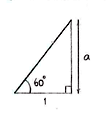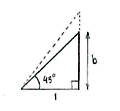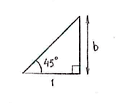Solution 4.2:6
From Förberedande kurs i matematik 1
(Difference between revisions)
m |
|||
| Line 1: | Line 1: | ||
| - | We can work out the length we are looking for by taking the difference | + | We can work out the length we are looking for by taking the difference <math>a-b</math> of the sides <math>a</math> and <math>b</math> in the triangles below. |
| - | <math>a-b | + | |
| - | of the sides | + | |
| - | <math>a</math> | + | |
| - | and | + | |
| - | <math>b</math> | + | |
| - | in the triangles below | + | |
| - | [[Image:4_2_6_13.gif|center]] | + | [[Image:4_2_6_13.gif|center]][[Image:4_2_6_2.gif|center]] |
| - | [[Image:4_2_6_2.gif|center]] | + | |
| - | If we take the tangent of the given angle in each triangle, we easily obtain | + | If we take the tangent of the given angle in each triangle, we easily obtain <math>a</math> and <math>b</math>. |
| - | <math>a</math> | + | |
| - | and | + | |
| - | <math>b</math> | + | |
| + | {| width="100%" | ||
| + | ||[[Image:4_2_6_13.gif]] | ||
| + | ||<math>a = 1\cdot\tan 60^{\circ} = \frac{\sin 60^{\circ}}{\cos 60^{\circ}} = \frac{\dfrac{\sqrt{3}}{2}}{\dfrac{1}{2}} = \sqrt{3}</math> | ||
| + | |- | ||
| + | ||[[Image:4_2_6_4.gif]] | ||
| + | ||<math>b = 1\cdot\tan 45^{\circ} = \frac{\sin 45^{\circ}}{\cos 45^{\circ}} = \frac{\dfrac{1}{\sqrt{2}}}{\dfrac{1}{\sqrt{2}}} = 1</math> | ||
| + | |} | ||
| - | + | Hence, | |
| - | + | ||
| - | <math>a= | + | {{Displayed math||<math>x = a-b = \sqrt{3}-1\,\textrm{.}</math>}} |
Current revision
We can work out the length we are looking for by taking the difference \displaystyle a-b of the sides \displaystyle a and \displaystyle b in the triangles below.
If we take the tangent of the given angle in each triangle, we easily obtain \displaystyle a and \displaystyle b.
Hence,
| \displaystyle x = a-b = \sqrt{3}-1\,\textrm{.} |



